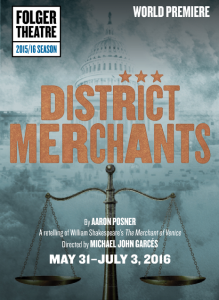“IT SHALL GO HARD
BUT I WILL BETTER THE INSTRUCTION”
Deep into the world premiere of Aaron Posner’s variation on The Merchant of Venice last Saturday, Shylock pointed at me from the stage and demanded my name.
I said, “Rohrer.”
Shylock spent 30 seconds heaping calumny upon the name of Rohrer: “Dirty Rohrer, stupid Rohrer, damned Rohrer. You know what’d be great? Round up all the Rohrers.” This, after two hours of soliloquies about how unpleasant it is to be hated. Not trusting his audience to get the message, Posner has Shylock insult a different playgoer every night. Through bad luck or fate, last Saturday Shylock called out a critic who already regretted his trip to the Folger.
Next, Shylock asked me, “How did that feel?”
I said, “Contrived.”
After some laughter the play lurched onward, but for me it never got better than that.
It wasn’t Shylock’s fault. Posner’s District Merchants is set during Reconstruction but packed with Television Age psychobabble and instantly-dated up-to-the-minute-isms of language and business. As directed by Michael John Garcés, it plays like an interesting concept commissioned from a playwright too hot right now to afford the time necessary to flesh it out. Where Stupid Fucking Bird made the tiredest of Chekhov’s plays into a profound and compelling romp, and Posner’s version of The Tempest made one of Shakespeare’s most problematic comedies into delightful carnival, District Merchants underlines the risks inherent in adapting a genius.
Posner’s obsession with soliloquy works perfectly in Bird; Chekhov’s characters are so lost and hapless that having them shatter the fourth wall (by demanding that the audience explain the characters’ motivations) completes a circle started in 1896. Tweaking the goatee of Chekhov’s realism by deconstructing The Seagull in real time is a worthwhile enterprise not because it’s cheeky, but because one century and one thousand productions in, during a period when so many plays are about plays anyway, epoch and idea happily converge.
Like Posner, Elizabethan playwrights generally and Shakespeare in particular were wont to have their characters flatly divulge their motivations. But Shakespeare usually managed to pack his stories with enough dramatic tension – whole ships-full in Merchant – that knowing a character’s wants only increases audience investment in what happens on stage. Then too, Shakespeare’s language as often as not supersedes drama as the primary draw. His words are deep and wide enough to support multiple hearings and multitudinous interpretations.
Posner’s point of entry here is to make all of Merchants’ primary characters duplicitous. Jessica and Lorenzo aren’t so much in love as looking for a getaway. Bassanio, the son of a slave and a slave owner, is passing for white when he woos Portia, who spends her days in drag at Harvard Law School. Shylock and Antonio, a Jew and a freeborn black, were both war profiteers and slave traders who now prey on a vulnerable population of newly freed African-Americans. It’s an interesting idea. But the practical result of making every character not only a liar and a cheat but one-note, though, is that every individual transgression is undercut by the generic nature of the universe. Nothing lands because there is no land; the world is a vaguely detestable wash.
Posner is very good at 21st-century banter, but his choice to place it in the mouths of 19th-century characters is a cheat. It is no less a cheat though Shylock and Antonio explain from the stage apron that this is a play-version 19th century where the rules are topsy-turvy. This bullshit is highlighted as a cheat whenever Posner tries elevated language; few of us can keep up with Shakespeare. It would be a task to enumerate the cheats in this half-thought-out play, but some scream loud: In the play’s courtroom climax, the black actors playing Nerissa and Launcelot abruptly inform the audience that they will now portray a white judge and a Jewish lawyer. This graceless one-off choice raises an obvious question about the cleverness everywhere lacking, but it pales beside the decision to omit the actual climax in which Shylock is denied his justice. A blackout falls while Shylock holds a knife to Antonio’s throat, after which, I kid you not, Antonio says at lights-up, “Well, I didn’t die.”
This is a trick Posner has pulled before. He also cops out at the end of Stupid Fucking Bird, cannily denying the audience closure, but what works for Chekhov fails here. District Merchants is not, like Bird, a wholesale literary dissection. True, Merchants does ignore basic rules of dramatic construction, but randomly, absently, as when Jessica appears from a void and announces to Lorenzo that it is time for them to tell each other the truth, apparently for no reason but that the other story elements are wrapping up. For most of its preachy length, Merchants seems earnest, going through the motions of telling a story except when it can’t be bothered.
District Merchants reminded me throughout of another recent bummer, Ellen McLaughlin’s Ajax in Iraq. Both prove that the prime hazard of rewriting a classic is not lack of quality but lack of necessity. McLaughlin’s relocation of Sophocles to modern Mesopotamia would have been more effectively achieved by a good director than a bad writer. Just so, Posner’s idea to set Shylock and Antonio’s conundrum after the American Civil War would be better realized by directing Shakespeare’s play to the new concept.
 To be sure, director Garcés was handed a problem of dubious merit, one that traded Shakespeare’s plotting and poetry for an essay treating an unwieldy melange including anti-Semitism, American anti-Africanism, the slave trade, carpetbagging, American race relations in the workplace and the bedroom, 19th-century sexism and misogyny, and the dynamics of familial estrangement. But the Folger production is not equipped for such a problematic text.
To be sure, director Garcés was handed a problem of dubious merit, one that traded Shakespeare’s plotting and poetry for an essay treating an unwieldy melange including anti-Semitism, American anti-Africanism, the slave trade, carpetbagging, American race relations in the workplace and the bedroom, 19th-century sexism and misogyny, and the dynamics of familial estrangement. But the Folger production is not equipped for such a problematic text.
The lights and costumes are appropriate to the venue and budget, but the visually impressive set lends awkwardness to the storytelling, forcing much of the action downstage center or into the house. Actors of disparate ability seem in some cases to have been directed against their own better judgment, resulting in stilted characterizations. Some cast members deliver performances of consistent integrity – Maren Bush nails the best-written and best-directed scene, and Celeste Jones and Akeem Davis do no wrong. Others pull true moments out of a wallow of low comedy and arch ponderousness. It’s not the cast’s fault; this script bleeds whether you prick it or not.
photos by Teresa Wood
District Merchants
Folger Theatre
201 East Capitol Street Southeast in Washington, D.C.
ends on July 3, 2016
for tickets, call 202.544.7077 or visit Folger








